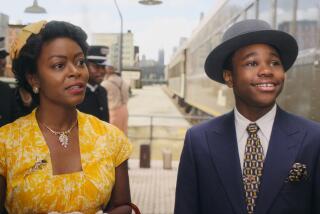‘The Long Walk Home’--Four Views : A Slice of Life From Another Time
- Share via
In today’s world, unlike old biblical times, we do not “visit the sins of the parents onto the children”; but even if we should, we must be sure that the children are true descendants of the parents. “The Long Walk Home” is a fine creative effort; it is not a pretentious piece of revisionist history, as is “Mississippi Burning.” It isolates a slice of life from a critical historical period, the Montgomery bus boycott.
The film focuses on two main characters, two average Southern wives (one black and one white) of mid-1950s urban Alabama. The plot is developed around their intra- and inter-family dynamics.
The key point here is that both of these families are typical for their racial and social groups in that society. Neither of them is driven sanctimoniously by high moral principles; they arrive at their final position of resistance and sacrifice through an evolutionary process.
True, that process and the forces driving it are different for both of these ladies, but the significant point is that they arrive at the same place--unwitting heroines in a fight against racism, cowardice and stupidity.
This film does not try to exploit our senses. It appears to me that the makers of this movie did not want to subordinate the essence and message of their story to a cliche-driven work full of cheap excitement, as did “Mississippi Burning.”
In “The Long Walk Home,” Odessa, played by Whoopi Goldberg, is a well-developed, sympathetic, noble character. Goldberg is a sensitive artist who has a deep understanding of the 1950s Southern black woman worker/housewife. She does not try to re-create the true historical role of Rosa Parks. That is left for another movie.
Sissy Spacek’s character (Miriam Thompson) is not the revolutionary Norma Rae--that movie has already been done. Nor is she any of the heroic white women of CORE and other civil rights organizations who put their lives on the line driving black demonstrations during that era.
Spacek plays well the part of a typical idle Southern white middle-class housewife, with no strong ideological position--no better nor worse than anybody else in her class or racial group. Her evolution to a role as civil rights participant is arrived at through pragmatic necessities. The blatantly stupid, cowardly and racist resistance of her husband and brother-in-law helps to drive that evolution.
More to Read
Only good movies
Get the Indie Focus newsletter, Mark Olsen's weekly guide to the world of cinema.
You may occasionally receive promotional content from the Los Angeles Times.









